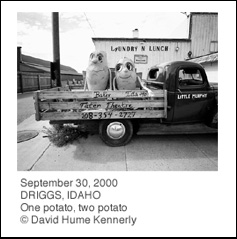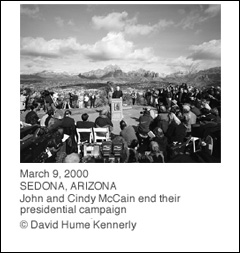|
Insights
into the New Millenium
October 2002
by Alison
Beck
|

|
Last month I described
the photographic archives at the University of Texas Center
for American History and how we actively work with our photojournalists
to announce the availability of their collections for research. This
month I am pleased to tell you about the Center's most recent project
to showcase the work of photojournalist David
Hume Kennerly whose archive here at the Center contains more than
one million images.
Kennerly's newest
book is Photo du Jour: A Picture-a-Day Journey through the F irst
Year of the New Millennium, published just this month by the University
of Texas Press as part of the Center's
Focus on American History Series . To promote Photo du Jour, the
Center is sponsoring a national tour of images from the book. The first
exhibit on the tour features 144 images at the Smithsonian
Institution's Arts & Industries Building in Washington D.C. irst
Year of the New Millennium, published just this month by the University
of Texas Press as part of the Center's
Focus on American History Series . To promote Photo du Jour, the
Center is sponsoring a national tour of images from the book. The first
exhibit on the tour features 144 images at the Smithsonian
Institution's Arts & Industries Building in Washington D.C.
For the past four decades
Kennerly has photographed national and international events from the
Vietnam War to the impeachment trial of President Clinton. A contributing
editor for Newsweek since 1996, Kennerly also has served as a contributing
photographer and editor for George, Time, and Life magazines and UPI,
and as personal photographer for President Gerald R. Ford. In 1972,
Kennerly received the Pulitzer Prize for his feature photography of
the Vietnam War. He also has photographed more than 35 covers for Time
and Newsweek.
In 1999, while preparing
to cover his eighth presidential campaign, Kennerly conceived the idea
of creating and publishing a visual diary of America in the first year
of the twenty-first century.  In
addition to documenting history-making moments, he planned to turn his
lens on daily life surrounding these moments. Kennerly wanted a special
camera for this project—not the Canon EOSIN he uses for his news
work. He chose to work with only one camera and one lens—the Mamiya
7, a medium-format range-finder camera with a 43 cm 4.5 wide-angle lens;
throughout the project he shot with black and white film. Kennerly captured
one photograph a day for his project while at the same time he focused
on the 2000 presidential campaign for Newsweek. The project took him
to thirty-eight states and seven countries. He crossed the U.S. from
coast-to-coast forty-one times and jetted across the Pacific Ocean four
times and the Atlantic twice. Altogether, Kennerly traveled more than
a quarter of a million miles. The result is a stunning and diverse collage
of people, landscapes and nature, cityscapes and architectural structures,
large and small events, famous landmarks, and shots of his own family.
Photo du Jour contains 515 of the images Kennerly took in the year 2000. In
addition to documenting history-making moments, he planned to turn his
lens on daily life surrounding these moments. Kennerly wanted a special
camera for this project—not the Canon EOSIN he uses for his news
work. He chose to work with only one camera and one lens—the Mamiya
7, a medium-format range-finder camera with a 43 cm 4.5 wide-angle lens;
throughout the project he shot with black and white film. Kennerly captured
one photograph a day for his project while at the same time he focused
on the 2000 presidential campaign for Newsweek. The project took him
to thirty-eight states and seven countries. He crossed the U.S. from
coast-to-coast forty-one times and jetted across the Pacific Ocean four
times and the Atlantic twice. Altogether, Kennerly traveled more than
a quarter of a million miles. The result is a stunning and diverse collage
of people, landscapes and nature, cityscapes and architectural structures,
large and small events, famous landmarks, and shots of his own family.
Photo du Jour contains 515 of the images Kennerly took in the year 2000.
 During
the course of his project, Kennerly showed his work to Don
Carleton, a long-time friend and the director of the Center for
American History. Carleton recognized that Kennerly's photographs would
create a coherent and historically significant publication which would
further the Center's mission to support research and education on the
history of the United States. Carleton urged Kennerly to have his book
published by the University of Texas Press as part of the Center's Focus
on American History series, for which he serves as series editor. As
Carleton noted, "We are honored to introduce David's new projects
to Austin and America." Additional sponsorship for the book was
provided by Digimarc
Corporation and Paris Photo Lab in Los Angeles. During
the course of his project, Kennerly showed his work to Don
Carleton, a long-time friend and the director of the Center for
American History. Carleton recognized that Kennerly's photographs would
create a coherent and historically significant publication which would
further the Center's mission to support research and education on the
history of the United States. Carleton urged Kennerly to have his book
published by the University of Texas Press as part of the Center's Focus
on American History series, for which he serves as series editor. As
Carleton noted, "We are honored to introduce David's new projects
to Austin and America." Additional sponsorship for the book was
provided by Digimarc
Corporation and Paris Photo Lab in Los Angeles.
 Kennerly's
passion for photography both in the middle of the action and behind
the scenes is imbedded in Photo du Jour. Both the book and the exhibit
feature photos of everyday American life as well as dozens of images
that Kennerly shot "on the road" during the 2000 presidential
campaign, including candid and never-before-seen photographs of Al Gore,
John McCain, and George W. Bush. Photo du Jour is also a vivid benchmark
about life before September 11, 2001. In the words of Howard Fineman,
Chief Political Correspondent for Newsweek magazine and author of the
book's introduction, "Kennerly's work is a "detailed portrait
of us at the Millenium--the last year, as it turns out, of what we now
can see was our innocence." Kennerly's
passion for photography both in the middle of the action and behind
the scenes is imbedded in Photo du Jour. Both the book and the exhibit
feature photos of everyday American life as well as dozens of images
that Kennerly shot "on the road" during the 2000 presidential
campaign, including candid and never-before-seen photographs of Al Gore,
John McCain, and George W. Bush. Photo du Jour is also a vivid benchmark
about life before September 11, 2001. In the words of Howard Fineman,
Chief Political Correspondent for Newsweek magazine and author of the
book's introduction, "Kennerly's work is a "detailed portrait
of us at the Millenium--the last year, as it turns out, of what we now
can see was our innocence."
THE
DIGITAL JOURNALIST WILL BE RUNNING AN INDEPTH PIECE ON DAVID KENNERLY
IN ITS NOVEMBER ISSUE
© Alison Beck
Contributing Columnist
al.beck@mail.utexas.edu
Alison Beck is Associate Director at the University of Texas Center
for American History. She heads the Research & Collections Division,
which is comprised of the Archives and Manuscripts, the Library, and
the Reference Units. She plans and manages projects to preserve and
provide access to the Center's extensive collections of photographs,
publications, manuscripts, newspapers, and sound recordings. These projects
include digital initiatives. Ms. Beck oversees publishing of the Center's
website.
|

 irst
Year of the New Millennium, published just this month by the
irst
Year of the New Millennium, published just this month by the  In
addition to documenting history-making moments, he planned to turn his
lens on daily life surrounding these moments. Kennerly wanted a special
camera for this project—not the Canon EOSIN he uses for his news
work. He chose to work with only one camera and one lens—the Mamiya
7, a medium-format range-finder camera with a 43 cm 4.5 wide-angle lens;
throughout the project he shot with black and white film. Kennerly captured
one photograph a day for his project while at the same time he focused
on the 2000 presidential campaign for Newsweek. The project took him
to thirty-eight states and seven countries. He crossed the U.S. from
coast-to-coast forty-one times and jetted across the Pacific Ocean four
times and the Atlantic twice. Altogether, Kennerly traveled more than
a quarter of a million miles. The result is a stunning and diverse collage
of people, landscapes and nature, cityscapes and architectural structures,
large and small events, famous landmarks, and shots of his own family.
Photo du Jour contains 515 of the images Kennerly took in the year 2000.
In
addition to documenting history-making moments, he planned to turn his
lens on daily life surrounding these moments. Kennerly wanted a special
camera for this project—not the Canon EOSIN he uses for his news
work. He chose to work with only one camera and one lens—the Mamiya
7, a medium-format range-finder camera with a 43 cm 4.5 wide-angle lens;
throughout the project he shot with black and white film. Kennerly captured
one photograph a day for his project while at the same time he focused
on the 2000 presidential campaign for Newsweek. The project took him
to thirty-eight states and seven countries. He crossed the U.S. from
coast-to-coast forty-one times and jetted across the Pacific Ocean four
times and the Atlantic twice. Altogether, Kennerly traveled more than
a quarter of a million miles. The result is a stunning and diverse collage
of people, landscapes and nature, cityscapes and architectural structures,
large and small events, famous landmarks, and shots of his own family.
Photo du Jour contains 515 of the images Kennerly took in the year 2000. During
the course of his project, Kennerly showed his work to
During
the course of his project, Kennerly showed his work to  Kennerly's
passion for photography both in the middle of the action and behind
the scenes is imbedded in Photo du Jour. Both the book and the exhibit
feature photos of everyday American life as well as dozens of images
that Kennerly shot "on the road" during the 2000 presidential
campaign, including candid and never-before-seen photographs of Al Gore,
John McCain, and George W. Bush. Photo du Jour is also a vivid benchmark
about life before September 11, 2001. In the words of Howard Fineman,
Chief Political Correspondent for Newsweek magazine and author of the
book's introduction, "Kennerly's work is a "detailed portrait
of us at the Millenium--the last year, as it turns out, of what we now
can see was our innocence."
Kennerly's
passion for photography both in the middle of the action and behind
the scenes is imbedded in Photo du Jour. Both the book and the exhibit
feature photos of everyday American life as well as dozens of images
that Kennerly shot "on the road" during the 2000 presidential
campaign, including candid and never-before-seen photographs of Al Gore,
John McCain, and George W. Bush. Photo du Jour is also a vivid benchmark
about life before September 11, 2001. In the words of Howard Fineman,
Chief Political Correspondent for Newsweek magazine and author of the
book's introduction, "Kennerly's work is a "detailed portrait
of us at the Millenium--the last year, as it turns out, of what we now
can see was our innocence."